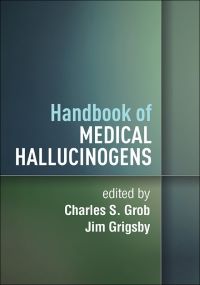 582 pages
582 pages18 CE credits
Course Enrollment
$290.00
Add to Cart
All exams are taken online. The exam for this course will be available in "My Courses" immediately upon enrollment. Note the book is not included.
The book is available for purchase from Amazon.
As an Amazon Associate we receive a rebate from qualifying purchases.
HANDBOOK OF MEDICAL HALLUCINOGENS
Charles S. Grob, Ed.Jim Grigsby, Ed.
Guilford Press, 2021
DESCRIPTION
A comprehensive compilation from experts in the field of medical hallucinogens which enables therapists to explore the promise of psychedelics in treatment of challenging psychiatric problems. Experts synthesize current knowledge on psilocybin, MDMA, ketamine, and other medical hallucinogens: the neurobiological mechanisms, clinical effects, therapeutic potential, risks, and practical clinical considerations, including patient screening, dosages, structuring sessions and managing adverse reactions.
EDUCATIONAL OBJECTIVESThe reader will be able to:
• Discuss the primary chemicals which are labeled "psychedelic" and provide an overview of the history of their use in medical practice
• Review the most validated measuring instrument(s) for measuring common psychedelic effects
• Explain the history of political and social charge against the use of psychedelics in medical research, and how these ideas are changing
• Recognize and discuss the shamanic and other practices where entheogens are used to alter consciousness
• Outline the main areas of the brain which are affected by psychedelic disruption
• List the three different phases of psychedelic therapy
• Explain the objectives involved in the term "psycholytic psychotherapy"
• Discuss therapeutic potential of salvia divinorum and medical use or non-use in the U.S.
• Explain what is known about the psychiatric use of ketamine in treating depression and OCD
• List clinical areas in which the discovery of LSD has stimulated research
• Outline some reasons that music is used in psychedelic therapy
• Utilize the suggestions provided for working as a successful and experienced guide in psychedelic sessions, especially in the use of psilocybin
• Outline positive potential, as well as challenges, for the use of psychedelics in conjunction with psychotherapy
• Be familiar with the list of adverse effects resulting from psychedelic drug use
• Define the meaning of "palliative care" in psychedelic treatment and the benefits of this care
• Review the clinical indications of DMT and DPT for treatment of various mental health disorders
• Analyze current conclusions on the treatment of depressive disorders with psychedelics"
AUTHOR
Charles S. Grob, MD, (Editor) is Professor of Psychiatry and Pediatrics at the David Geffen School of Medicine at the University of California, Los Angeles, and Director of the Division of Child and Adolescent Psychiatry at Harbor-UCLA Medical Center. He previously held faculty positions at the Johns Hopkins University and the University of California, Irvine. Dr. Grob has conducted approved clinical research with psychedelics since the early 1990s and has published numerous articles on psychedelics in the medical and psychiatric literatures, as well as several books. He is a founding board member of the Heffter Research Institute.
Jim Grigsby, PhD, (Editor) is Professor in the Department of Psychology, and in the Division of Health Care Policy and Research of the Department of Medicine, at the University of Colorado Denver. His research and over 250 publications have focused on neuropsychology, cognitive neuroscience, telemedicine, and other areas of health services research. His work in neuroscience includes extensive research on executive functioning and on the clinical phenotypes of fragile x-associated tremor/ataxia syndrome (FXTAS), of which he was a co-discoverer. Dr. Grigsby's current research interests include the therapeutic use and mechanisms of psilocybin and MDMA.
"If you're looking for a comprehensive work on hallucinogens, this is it! This book can benefit all, from novice to expert. Grob and Grigsby take the reader on a journey through all aspects of medical hallucinogens, including their neuroscience, therapeutic considerations, and more. The book dives into individual hallucinogens and incorporates contributions from leading experts in the field. This is the ideal reference and text for the current renaissance of psychedelic research.
-- Rick Doblin, PhD, Executive Director, Multidisciplinary Association for Psychedelic Studies
"This volume is a wide-ranging, interdisciplinary, state-of-the-art overview of the powerful and curious chemicals variously known as hallucinogens, psychedelics, and entheogens. The Handbook surveys their history, cross-cultural use, therapeutic potentials, and implications for our understanding of human psychology and mental health."
-- Roger Walsh, MD, PhD, DHL, Professor Emeritus of Psychiatry, Philosophy, and Anthropology, University of California, Irvine
"This fantastic book has managed to thoughtfully address literally every aspect of psychedelics and psychedelic medicine in a single volume. Following an in-depth history of these medicines, with special attention paid to cultural and ecological aspects, chapters examine the major psychedelic compounds, neuroscience, psychotherapeutic elements, and specific clinical indications, before concluding with explorations of philosophical and existential implications. A superb addition to the field, this is an excellent resource for both the newcomer looking for a thorough introduction to psychedelics and the experienced clinician who seeks a deeper understanding of these substances' history and psychotherapeutic potentials."
-- Franklin King IV, MD, Director, Training and Education, Center for Neuroscience of Psychedelics, Massachusetts General Hospital; Instructor, Department of Psychiatry, Harvard Medical School
"The Handbook of Medical Hallucinogens is my go-to text for students interested in learning more about the pharmacology of psychedelics, their history and place in culture, and their future in healthcare practice."
-- Andrew Penn, MS, PMHNP-BC, Clinical Professor, School of Nursing, University of California, San Francisco
ISHK CE at Home
1702-L Meridian Ave., #266
San Jose, CA 95125-5586
This website uses cookies to ensure you get the best experience on our website. Learn more
